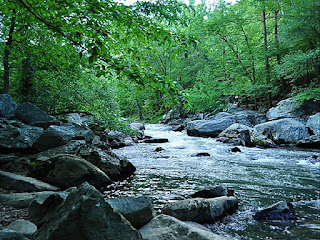Because there were never very many of you to begin with:
The long goodbye to the Maryland darter - Fish to be declared extinct after
final search comes up empty (Bay Journal)
The Maryland darter, one of the rarest fish in the world, has been missing in
action for 33 years. Now, it is headed to the extinction list. The impending
move comes after one last intensive “fish hunt” by Maryland wildlife officials
and private groups this summer and fall. The hunt focused on several
tributaries of the Susquehanna River, where Maryland darters have been known
to live, as well as a few streams and creeks that seemed to have suitable
habitat.
The fish was the only animal of any kind known to be found
solely in Maryland.
In the largest search ever mounted for a
Maryland fish, crews repeatedly used snorkeling, seining, water shocking and
even bottom-dragging electric trawling nets — all with no success.
 |
| Maryland Darter |
In 1912, two biologists from Cornell University doing a federal survey of
ray-finned fish in the Chesapeake Bay were seining in Swan Creek, a
fast-flowing stream in the upper reach of the Bay near Havre de Grace.
“On
a long, stony riffle where the bottom was comparatively free from boulders and
the current so swift that one would not have expected to find fishes of any
kind,” a pair of small fish with “a very striking appearance” danced in their
seine nets.
Nobody had ever seen one. Lewis Radcliffe and William
Welsh gave it the scientific name Etheostoma sellare and the common name
Maryland darter. But the fish immediately showed itself to be extraordinarily
elusive. No sooner had the scientists announced their discovery in a
scientific journal then it disappeared — for 50 years.
In 1962, the
darter was “rediscovered” when yet another Cornell contingent, researcher
Leslie Knapp and his students, found an adult female concealed among a school
of tessellated darters in Gasheys Run, a Swan Creek tributary. The finding
sparked a flurry of new efforts to find the fish that lived in the fast lane
of strong riffles.
 |
Deer Creek, Maryland
|
Another was found in the stream three years
later. That same year, darters were found for the first time farther north in
Deer Creek, a fast-moving stream that flows into the Susquehanna River below
the Conowingo Dam. From then until the last one was observed in 1988, only
Deer Creek yielded darters.
In a heyday of sorts, between 1965 and
1977, Knapp, Raesly and their students observed 77 Maryland darters.
Recognizing
the scarcity of the fish species, the Maryland darter was declared federally
endangered in 1967. Despite new protections afforded by the listing, the
bottom dropped out again; only 25 were recorded between 1978 and the last
sighting in 1988.
 |
| MD biologist looks for darter |
Official records show 106 Maryland darters collected between 1912, when it
was discovered, and 1988, when Raesly swam with the last one. It also is known
that there are about 80 of the fish preserved in museum and university
collections.
That gives rise to a question: Was the darter already on the brink of
extinction and then pushed over the edge by scientists and collectors?
Raesly
never kept any of the darters he found. Sacrificing 80 of them for scientific
purposes over 76 years should not be blamed for the species’ end, he said. In
retrospect, Raesly said that Maryland darters were likely well on their way to
extinction for other reasons.
“It may have been a factor in their
ultimate demise, but a number of water-quality factors prior to that started
them on the downward trajectory,” he said.
There are lots of successful darters, and more than a few examples of extremely rare and endangered darters. See "Snail Darter" if you don't remember the controversy. While I'm sure some factor in their ecological niche determines whether a species like this is widespread and resilient to land use changes, or highly localized, and vulnerable to changes in its habitat.
Here's hoping the Maryland Darter manages to elude scientists for many more years, and then emerges again, and blows them a raspberry.



No comments:
Post a Comment